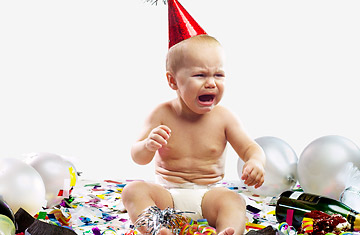
(2 of 8)
There is nothing natural about the economic meltdown we are still struggling with as the decade winds down. A housing bubble fueled by cheap money and excessive borrowing set ablaze by derivatives, so-called financial weapons of mass destruction, put the economy on the brink of collapse. We will be sorting through the damage for years. Meanwhile, the living, breathing symbol of this economic sordidness, prisoner No. 61727-054, a.k.a. Bernie Madoff, rots away in a Butner, N.C., jail cell, doing 150 years for orchestrating the biggest Ponzi scheme in the history of humanity.
The Great Meltdown
Were we Americans alone in our troubles? Hardly. The Asian Tsunami of 2004 killed more than 200,000 people. And our financial meltdown quickly spread around the developed world. Yet from our lofty perch overlooking the 20th century--the American Century, TIME's co-founder once labeled it--the fall has been precipitous. Who among us is unscathed? Not many. Even if none of your family members died in combat, you had no money with Madoff and you own your house free and clear, you most likely still took a hit. To paraphrase the question Ronald Reagan posed years ago, Are you better off today than you were at the beginning of the decade? For most of us, the answer is a resounding no. Let us count the ways. For one thing, the stock market is down 26% since 2000, making this the worst decade for stocks. (Inflation-adjusted, it's even worse.) I remember Warren Buffett telling me at the beginning of the decade that there was no way the go-go returns of the 1990s were going to continue and that we had better get used to meager returns going forward. Buffett saw it coming.
For the average working stiff, it was a pretty lousy 10 years. The median household income in 2000 was $52,500. Last year (the most recent year available) it was $50,303. And given that the unemployment rate has climbed to 10.2%, income will almost certainly drop again this year. Low-income Americans fared even worse. In 2000, 11.3% of Americans were living below the poverty line. By 2008, that number had risen to 13.2%. Meanwhile, the percentage of Americans without health insurance increased from 13.7% to 15.4%.
Surprisingly, housing prices were not such a debacle--that is, if you bought early and stayed put. The median price of an existing home was $143,600 in 2000. Today the median is nearly $175,000. But remember, millions of Americans splurged for homes in the middle of the decade when prices were high: in July 2006 the median selling price peaked at $230,300. If you bought then--assuming you haven't lost your house to foreclosure--your home has lost some 25% of its value. Nothing to cheer about there.
Our national psyche has been damaged as much as our national economy by the record number of corporate bankruptcies, many of them household names: Kmart, United Airlines, Circuit City, Lehman Brothers, GM and Chrysler. The price of oil more than tripled this decade, settling at more than $70 a barrel, straining our economy.
